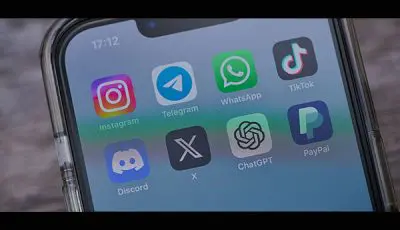Maybe Someday It Will Sink In: The Web Isn’t A Magazine
 SAN FRANCISCO – It was early 1998, and I’d had my online porn-job for about eight months. The company was quite small, and as fate would have it, when the office phone’s main line rang that afternoon, I was the only one available to answer.
SAN FRANCISCO – It was early 1998, and I’d had my online porn-job for about eight months. The company was quite small, and as fate would have it, when the office phone’s main line rang that afternoon, I was the only one available to answer.
When I did, I was met with a very aggressive young attorney who was already in a lather over the fact his client’s trademark was being used without permission on one of our websites. What was I going to do about it, he wanted to know; did I want to get sued?
After a few useless exchanges in which I unsuccessfully tried to get information which might help solve the problem – like, you know, the precise page this fucking trademark allegedly appeared on – I started to lose my patience, if not my shit.
“Look man,” I said, straining to call him “man” and not any of the other possible terms bouncing around in my head, “unless you tell me where this mark is, and what this mark is, it’s going to be a little hard for me to take the goddamn thing down, don’t you think?”
Somehow, incredibly, he saw the truth to what I’d just said.
The angry attorney then started reading the URL to me, complete with “H-T-T-P-colon-backslash-backslash.” By the time he got to the domain name, it was clear the site he was talking about wasn’t ours, but a site operated by one of the webmasters on our affiliate program, which just happed to have one of our paysite banners near the top of the home page.
Obviously, this meant I couldn’t conduct the removal of his mark from the site directly, myself; the best I could do was forward his complaint along to the webmaster in question, and ask him to remove the mark.
I tried explaining this to the outraged prick at the other end of the phone line, but he wasn’t having it.
“No, you will remove my client’s mark immediately,” he said. “Not only that, but you will remove all reference to my client’s mark from the internet.”
I did what anybody in my position would do after fielding a demand like that; I started laughing my ass off.
To be fair, in 1998 the internet was still new to a lot of people, and clearly this poor, misguided lawyer was one of those people. As he saw it, our site’s banner was on that site, therefor we had control of the site, therefor… well, OK, I don’t really know how he got from there to the notion we controlled the entire fucking internet, but get there he did.
While it’s not quite the same thing, I’m reminded of that phone call every time I read an article like this one, which asks “Is Twitter doing enough to crack down on porn links?”
“While Twitter, for the most part is a vast collection of pithy 280-character sentiments, you may have clicked a link or two that showed an explicit image,” writes John Brandon of Fox News. “It’s surprising because Twitter is mostly meant for everyday folks – and kids, who can sign up at age 13.”
No John, it’s not “surprising” that there’s porn on Twitter.
Twitter is a platform to which just about anybody can post just about anything, and if the last couple decades have taught us nothing else, you’d think it has taught us when just about anybody can post just about anything, a certain percentage of users are going to post porn – and some of those users are even going to be “everyday folks,” not porn stars, porn marketers or porn bots.
Sure, there’s more Twitter could do to “crack down on porn links,” but since Twitter has decided it doesn’t want to do away with porn links altogether, there will likely always be limits to what the platform can do to prevent users who shouldn’t or don’t want to see those links from encountering them.
At some point, AI may evolve to the point where it can so reliably identify adult content (as opposed to occasionally thinking sand dunes are naked people) social media platforms like Twitter will be able depend on it to keep porn away from minor users (or the minor users who identify themselves as such, at least) and those who just don’t want to be exposed to porn, but that time hasn’t come yet.
I think a lot of people (possibly including John Brandon of Fox News) still think of the internet and social media platforms as being like publications, something akin to a magazine, newspaper or book. They look at Twitter as something “controlled” by the company which owns it, and imagine this control should include being able to prevent the publication of disfavored materials and speech in real-time. This notion doesn’t represent a character flaw, it doesn’t make them bad people, but it sure does represent a fundamental misunderstanding of the technology they’re using.
There are many valid criticisms to be had of social media and its various platforms – but at the end of the day, the ones at fault for most of the issues and problems on social media are the users themselves, not the companies which operate the platforms. It’s not just the scammers, cyber criminals and trolls who poison the social media pool, either; some of those ‘everyday folks’ can be seriously unhinged assholes when they put their minds to it.
This fact is the reason why safe harbors like section 230 of the Communications Decency Act and section 512 of the Digital Millennium Copyright Act exist, and why they’ve been broadly interpreted by the courts to protect not just hosting companies and other ISPs, but the operators of sites like Twitter and Facebook, as well. The safe harbors are a recognition of the difficulty (or even impossibility) of preventing third-parties from posting whatever pops into their fool, or criminal, head.
Maybe someday AI will save us from ourselves when it comes to social media – or maybe it will take over our weapons systems and nuke us off the face of the planet, which would also solve our social media problems, I suppose.
We’re not there yet, though. Until we are, my suggestion to the truly porn-averse is to be careful who they follow and friend – and teach their kids to do the same.













